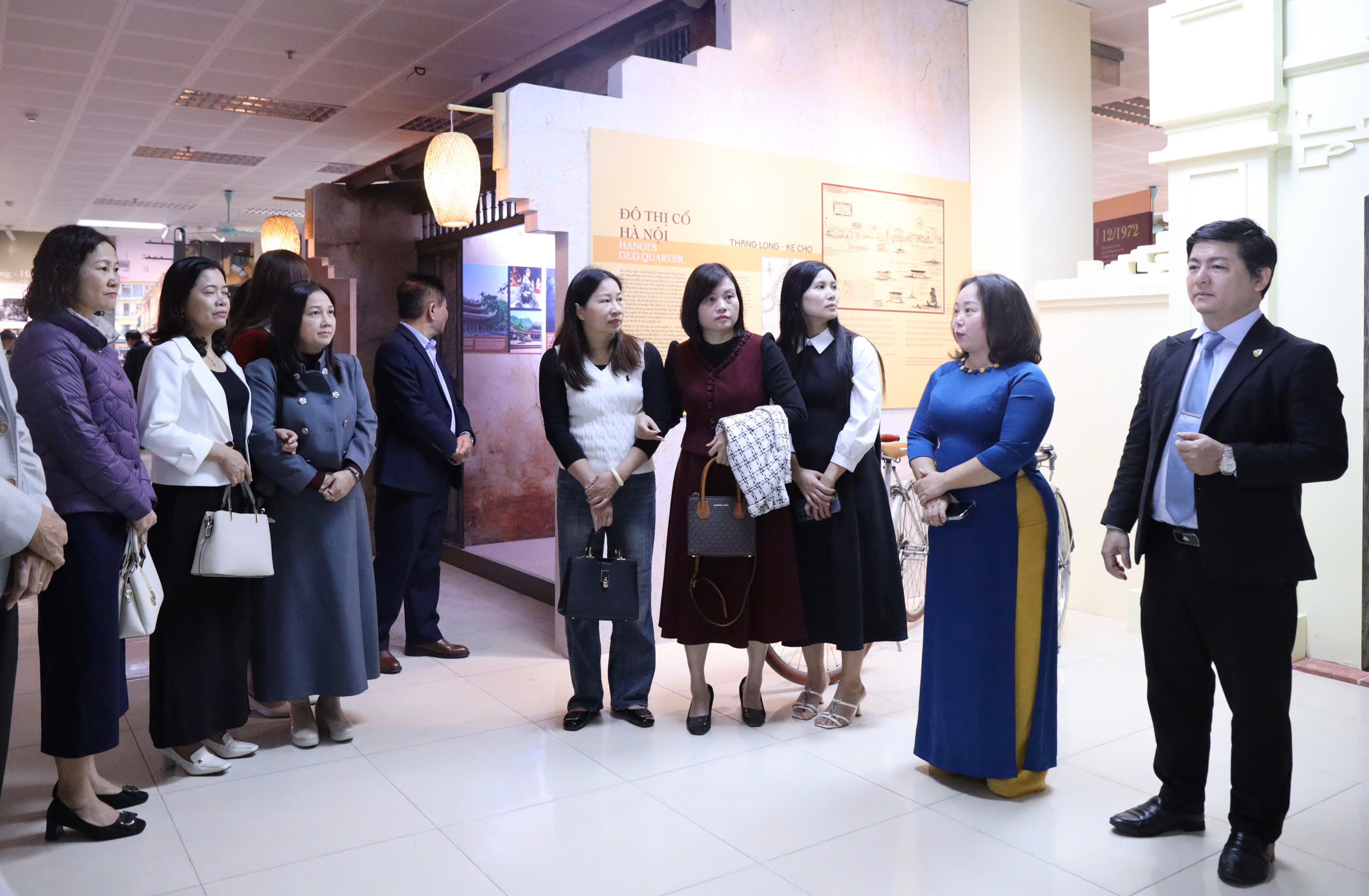Promoting the Leadership Role of Cadres, Civil Servants, and Public Employees in Building a Civilized, Modern, Efficient, and Effective Capital City Administration

Recently, Associate Professor Dr. Nguyễn Anh Tuấn published an article in the Communist Review on the topic: “Promoting the leadership role of cadres, civil servants, and public employees in building a civilized, modern, effective, and efficient capital city administration.”
Hanoi Metropolitan University is pleased to publish the full text of the article as follows:
The development goals for the Capital in the new period require the promotion of the potential and roles of every cadre, Party member, civil servant, and public employee. In this context, “leadership role” is not limited to managerial positions, but also encompasses the proactive, responsible, and creative spirit—as well as the willingness to think boldly and act decisively—of each individual in the performance of their duties. This serves as a solid foundation for building a civilized, modern, effective, and efficient capital city administration that meets the expectations of the people and the development demands of the nation.

The Necessity of Building a Civilized, Modern, Effective, and Efficient Capital City Administration
In the context of the country entering a breakthrough stage of development, driven by the aspiration for national prosperity and deep international integration as emphasized in the Resolution of the 13th National Party Congress, the role of Hanoi—the capital city, the heart of the nation, and the political, economic, cultural, and social center—has become increasingly pivotal. Our Party has affirmed: “Developing the Capital Hanoi into a city of 'Civilization – Culture – Modernity' is a particularly important political task in the strategy for national construction and defense.”(1) Therefore, building a civilized, modern, effective, and efficient administrative system is not only an urgent requirement but also a decisive factor for the sustainable development and elevated stature of Hanoi in the new era.
Such an administration must place citizens and businesses at its center, delivering better public services, resolving people's concerns more swiftly and effectively, thereby improving the quality of life for the people of the capital. An effective and capable administrative apparatus contributes to maintaining political stability, ensuring social order and safety, and constructing a positive image of Hanoi in the eyes of international friends. A transparent and streamlined administrative system also facilitates investment attraction, stimulates business activities, and promotes the socio-economic development of both the Capital and the nation.
To build a civilized, modern, effective, and efficient administrative system for the Capital, the following requirements must be met:
Civilization – A People-Centered Administration
Service-oriented public service culture: Deeply internalize the viewpoint that “the people are the foundation,” and build a team of upright, dedicated, and professional cadres, civil servants, and public employees of the Capital who truly serve as “public servants of the people.” Every act of public service must reflect respect, attentiveness, and a wholehearted commitment to addressing the legitimate needs of citizens and businesses in a prompt and convenient manner.
Transparency and accountability: Rigorously implement regulations on openness and transparency in state management activities—from procedures and processes to planning and policymaking. Enhance the accountability of all levels, sectors, and individuals in the performance of their duties, ensuring the people’s right to supervision.(2)
Public service ethics: Strengthen administrative discipline and order; uphold revolutionary and professional ethical standards in accordance with the spirit of Conclusion No. 01-KL/TW dated May 18, 2021, of the Politburo, “On continuing to implement Directive No. 05-CT/TW dated May 15, 2016, of the 12th Politburo, on promoting the study and practice of Ho Chi Minh’s ideology, morality, and style.” Take firm action against corruption, negativity, wastefulness, bureaucracy, and harassment, thereby reinforcing public trust in the state apparatus.
Standardized communication: Foster a civil, respectful, and culturally appropriate environment for administrative communication, promoting consensus and cooperation between state agencies and citizens, businesses, as well as within the administrative system itself. (3)
Modernization – Seizing Opportunities from the Fourth Industrial Revolution
Comprehensive digital transformation: Effectively implement Resolution No. 57-NQ/TW dated December 22, 2024, of the Politburo, “On the breakthrough development of science, technology, innovation, and national digital transformation,” and Resolution No. 18-NQ/TU dated December 30, 2022, of the Hanoi Party Committee, on “Digital transformation and building a smart Hanoi by 2025, with an orientation toward 2030.” Prioritize the provision of advanced, smart, and personalized online public services that deliver genuine convenience and efficiency for citizens and businesses.
Application of advanced technologies: Proactively research and apply achievements of the Fourth Industrial Revolution, such as artificial intelligence (AI), big data, the Internet of Things (IoT), etc., to smart urban management, forecasting, policymaking, monitoring, and evaluating the effectiveness of administrative operations.
Development of a smart city: Synchronously implement solutions to build and operate an effective intelligent management system in key areas such as transportation, energy, environment, healthcare, and education, thereby enhancing the quality of life for citizens and the efficiency of urban governance.(4)
Modernization of procedures and working methods: Apply advanced governance models and streamlined, flexible workflows based on data and evidence to support accurate and timely decision-making, improving the productivity and effectiveness of the administrative apparatus.
Effectiveness – Ensuring Discipline and the Rule of Law
Strong institutional capacity: Continue to improve the legal and institutional system of the Capital, with a focus on effectively implementing the revised 2024 Capital Law, ensuring consistency, coherence, and feasibility to meet the demands of rapid and sustainable development in the new era.
Strict enforcement: Enhance the capacity for law enforcement and oversight to ensure that all guidelines and policies of the Party and State, as well as decisions of the municipal government, are implemented comprehensively, effectively, and meaningfully in everyday life.
Clear decentralization and delegation of authority: Seriously uphold the principles of decentralization, delegation, and authorization, closely linked with strengthened inspection and supervision, to ensure unified direction and administration while promoting the autonomy and creativity of all levels and sectors.(5)
High-quality human resources: Focus on building a team of cadres, civil servants, and public employees in the Capital with firm political integrity, exemplary moral character, deep professional knowledge, and strong execution capacity—individuals who dare to think, dare to act, and dare to take responsibility for the common interests of the Capital and the nation.(6)
Efficiency – Optimizing Resources and Enabling Development
Streamlining the apparatus: Implement Resolution No. 18-NQ/TW of the 12th Party Central Committee on continuing to reform and reorganize the political system toward a lean, efficient, and effective structure. Review and restructure administrative organizations to reduce overlapping units and intermediary levels, and eliminate duplication of functions and tasks.
Simplifying administrative procedures: Continue to vigorously promote administrative procedure reform by cutting and simplifying cumbersome and burdensome processes that inconvenience citizens and businesses, thereby reducing compliance costs and creating an open, favorable investment and business environment.
Results-based management: Strongly transition from process-based management to results- and performance-based management, enhancing the autonomy and accountability of agencies, units, and individuals.
Efficient use of resources: Manage and utilize public resources (finance, land, public assets, etc.) economically and effectively to best serve the development of the Capital and improve the quality of life for its residents.
A Capital administrative system that meets these requirements will not only effectively address internal challenges but also play a developmental role—proactively removing bottlenecks, fostering a transparent, equitable, and favorable investment and business climate, attracting resources, and promoting innovation. At the same time, it must be capable of quickly adapting to domestic and global changes, driving and spreading development across the Capital Region and the entire country.
Building a strong administrative system for the Capital that meets the demands of the new era is a vital political mission. It requires the close leadership and direction of the Party Committee, People’s Council, and People’s Committee of Hanoi; the concerted efforts of the entire political system; the relentless dedication of the team of cadres, civil servants, and public employees; and the active participation and effective oversight of citizens and the business community. In this context, promoting the “leadership role” of each civil servant and public employee in the Capital is a decisive factor in building a truly civilized, modern, efficient, and effective administrative system.
Promoting the Leadership Role of Each Civil Servant and Public Employee is the Core Factor
"Leadership Role" – The Proactive Mindset of the Public Official
In traditional perception, the concept of “leadership” is often equated with managerial or executive positions. However, in light of the 13th National Congress of the Communist Party’s Resolution emphasizing the promotion of socialist democracy and the people’s role as masters of the country(7), and in the context of building an increasingly complete socialist rule-of-law state, the “leadership role” must be understood in a more comprehensive and profound way. It represents the spirit of responsibility, proactiveness, exemplary conduct, autonomy, initiative, creativity, and the courage to think, to act, and to take responsibility before the Party, the State, and the People—within the scope of each public servant’s or employee’s assigned duties and responsibilities.
In the book “The 7 Habits of Highly Effective People” by Stephen R. Covey, the author emphasizes the habit of being proactive—encouraging individuals to take responsibility for their lives, to choose positive responses in all situations instead of blaming external circumstances(8). This is considered one of the seven crucial keys to individual success and to the development of a civilized and modern society. Therefore, each civil servant and public employee in the Capital, when promoting their “leadership role” in their respective positions, must embody the following elements:
Proactive and creative for the common goal: Actively study and propose innovative solutions and improvements to work processes, enhance task efficiency, and contribute to the successful fulfillment of the political missions of their agencies, units, and the city at large.
Exemplary Performance of Duties: Uphold a strong sense of responsibility, demonstrate dedication to work, proactively overcome difficulties, and persistently pursue objectives to achieve the highest results. Continuously strive for self-improvement in both professional knowledge and practical skills.
Solidarity and Cooperation for Development: Be willing to share experiences and support colleagues, foster a united and strong collective, and create a democratic, open working environment that harnesses collective strength.
Devotion to Serving the People: Always place the interests of the Party, the State, and the people above all else; show respect, listen attentively, and respond promptly and effectively to legitimate requests from citizens and businesses, thereby strengthening the close bond between the government and the people.
Integrity and Compliance with the Law: Maintain revolutionary moral standards, practice honesty and integrity, strictly adhere to administrative discipline and the laws of the State, and resolutely combat corruption, negativity, and wastefulness.
Continuous Learning and Professional Development: Recognize the increasingly high demands of the national renewal process and international integration; proactively study political theory, enhance professional qualifications, improve practical skills, and meet the requirements of the new era.
Promoting the “leadership role” of each civil servant and public employee is not only an individual requirement but also a pivotal and decisive factor for the success of building a civilized, modern, effective, and efficient administrative system in the capital city. When every official, Party member, civil servant, and public employee deeply understands their role as an active agent, and demonstrates autonomy, creativity, the courage to think, act, and take responsibility, it generates powerful internal motivation. This, in turn, unleashes the vast potential of the workforce, enabling them to overcome all challenges and successfully fulfill assigned tasks.
Moreover, the proactiveness and sense of responsibility of each civil servant and public employee in performing public duties ensure that tasks are handled swiftly and accurately from the outset. This minimizes delays, avoids the shifting of responsibilities, and enhances the effectiveness of implementing the Party’s and the State’s guidelines and policies. Encouraging creativity and process innovation from those directly involved in operations helps optimize resources, save time, reduce costs, and improve labor productivity and the overall efficiency of the administrative apparatus.
A strong sense of responsibility, devoted service, and personal integrity of each civil servant and public employee contribute to building an image of a friendly and approachable administration—one that respects and listens to the people. This helps reinforce public trust in the leadership of the Party and the management of the State. A proactive and cooperative working environment also fosters the development of a professional, civilized workplace culture.
In the context of the Fourth Industrial Revolution and the new demands arising from the amended Capital Law (2024), a team of civil servants and public employees with leadership thinking will be more flexible in accessing and applying scientific and technological advances. They will be more proactive in adapting to change and proposing innovative solutions to emerging issues.
Unleashing Strategic Leadership Capacity:
When civil servants and public employees at all levels proactively take responsibility and successfully carry out their duties, senior leaders will have more time and resources to focus on strategic planning and macro-level policymaking, ensuring the sustainable development of the capital city.
A profound understanding and strong promotion of the leadership role of each civil servant and public employee in the capital is one of the core tasks and key factors in realizing the goal of building a truly civilized, modern, effective, and efficient administrative system. This is essential to meeting the increasingly high demands of national development and defense in the new phase of the country’s progress.
Solutions to Promote the Leadership Role of Each Civil Servant and Public Employee in the Capital
To successfully achieve the goal of building a civilized, modern, effective, and efficient administrative system for the capital city, the promotion of the leadership role of each civil servant and public employee must be carried out comprehensively and decisively through the following solutions:
1. Enhancing Political Awareness and Public Service Responsibility
Strengthen political and ideological education:
Vigorously disseminate and instill the Party's guidelines and policies, and the State’s laws and regulations—especially resolutions and directives concerning Party-building, the development of a clean and strong political system, and the improvement of the effectiveness and efficiency of the state apparatus. Each cadre, civil servant, and public employee must deeply understand their roles and responsibilities in the cause of building and developing the capital.
Foster a strong sense of service to the people:
Educate and nurture a public service mindset and a deep sense of responsibility toward the Party, the State, and the people among all civil servants and public employees. They must genuinely represent the will, aspirations, and legitimate interests of the people, and work with dedication and diligence to address public matters without causing inconvenience or harassment.
Ignite a spirit of dedication and contribution:
Create an environment where each civil servant and public employee is aware of the shared development goals of their unit and the city. This will inspire a spirit of initiative, creativity, bold thinking, willingness to act and take responsibility, and a readiness to give their best for the prosperous, civilized, and modern development of the capital.
2. Comprehensive Development of Leadership and Management Capacity
Focus on systematic and comprehensive training:
Organize structured training programs that not only emphasize professional and technical expertise but also prioritize the development of soft skills, critical thinking, the ability to handle complex problems, self-leadership, team leadership, and change management.
Build a core team with both virtue and capability:
Identify, nurture, and appoint civil servants and public employees who possess strong moral character, leadership and management skills, innovative thinking, and the courage to make breakthroughs. These individuals will serve as a high-quality source of future leadership for the city.
Empowerment and clear decentralization:
Boldly decentralize and delegate authority with clearly defined responsibilities, allowing civil servants and public employees the autonomy to perform their duties, showcase their creativity, and take personal responsibility. At the same time, strengthen oversight and supervision mechanisms to ensure proper exercise of delegated powers.
Create a Culture of Lifelong Learning:
Encourage and facilitate self-directed learning, research, participation in seminars, scientific forums, experience exchange, and continuous knowledge updates among civil servants and public employees to meet the demands of the new era.
Rotate, Assign, and Challenge Staff:
Implement planned staff rotation and reassignment to allow officials to experience various positions, develop political acumen, and enhance comprehensive capabilities. Assign challenging and breakthrough tasks to provide opportunities for demonstrating leadership capacity and political courage.
3. Foster a Democratic, Innovative, and Collaborative Work Environment
Promote exemplary leadership from the top:
Party secretaries and heads of agencies and units must truly be exemplary leaders in all aspects, possessing strategic vision, the ability to inspire, motivate, and guide their teams toward outstanding performance.
Innovate leadership and management thinking:
Transition from command-based, administrative management to leadership by persuasion, role modeling, consensus building, and mobilizing collective strength. Leaders at all levels should actively listen to their subordinates, and encourage the participation of civil servants and public employees in planning and decision-making processes.
Build a professional and civilized public service culture:
Establish a work environment that fosters openness, trust, respect, and encourages collaboration and knowledge-sharing among colleagues. Promote teamwork and alignment toward common goals.
Establish effective feedback mechanisms:
Develop a transparent, regular, and multidimensional feedback system to assess work performance and leadership effectiveness of each civil servant and public employee. Promptly recognize and reward positive contributions and innovative efforts.
4. Improve a Comprehensive and Synchronized Policy and Institutional Framework
Develop comprehensive evaluation criteria for officials:
Improve the system of scientific, objective, and transparent criteria for evaluating civil servants and public employees, with particular emphasis on leadership and management capabilities, initiative, creativity, responsibility, and task performance effectiveness. Evaluation results should serve as a key basis for planning, appointment, training, development, and staff deployment.
Promote administrative reform:
Continue reviewing, streamlining, and simplifying administrative procedures to ensure transparency and convenience for citizens and businesses. Create favorable conditions for civil servants and public employees to unlock their full potential and leadership capacity in public service.
Strengthen the application of science and technology:
Vigorously implement digital transformation in administrative management activities, build e-government, and move towards digital governance. Equip civil servants and public employees with digital knowledge and skills so they can adapt to and lead this transformation process.
Improve reward and incentive mechanisms:
Develop a fair and motivating incentive system that is commensurate with the abilities and contributions of civil servants and public employees. Timely and appropriately reward individuals and collectives with outstanding achievements and effective initiatives and solutions.
5. Strengthen Inspection, Supervision, and Administrative Discipline
Enhance the inspection and supervision of the implementation of Party and State policies, legal regulations, and municipal directives regarding personnel management and public service activities. Take firm action in preventing and combating corruption, misconduct, and waste. Strictly handle irresponsible behaviors that cause inconvenience to citizens and businesses or damage the credibility of the capital’s administration. Promote public oversight by enabling citizens to monitor the performance of the administrative apparatus and public workforce through various feedback and social criticism channels.
The comprehensive and effective implementation of these solutions will create significant transformation in the awareness and actions of each civil servant and public employee in the capital. Unleashing and enhancing their leadership potential is not only a key strategy for improving the quality of human resources, but also a solid foundation for building a truly people-centered administrative system—one that drives sustainable development for the capital and the nation in this new stage of progress.
Assoc. Prof. Dr Nguyễn Anh Tuấn
Chairman of the University Council, Hanoi Metropolitan University
----------------------------
(1) Nghị Quyết số 15-NQ/TW, ngày 5-5-2022, của Bộ Chính trị, “Về phương hướng, nhiệm vụ phát triển Thủ đô Hà Nội đến năm 2030, tầm nhìn đến năm 2045”.
(2) Xem: PGS, TS Dương Thị Liễu - TS Nguyễn Thị Hường: “Nâng cao sự minh bạch và trách nhiệm báo cáo giải trình của chính quyền địa phương các cấp thành phố Hà Nội”, Tạp chí Quản lý nhà nước, https://www.quanlynhanuoc.vn/2025/04/14/nang-cao-su-minh-bach-va-trach-nhiem-bao-cao-giai-trinh-cua-chinh-quyen-dia-phuong-cac-cap-thanh-pho-ha-noi/, ngày 14-4-2025.
(3) Xem: Ngọc Hải: “Xây dựng văn hóa công vụ trong các cơ quan hành chính nhà nước hiện nay”, Tạp chí Cộng sản điện tử, https://www.tapchicongsan.org.vn/web/guest/ky-nguyen-moi/-/2018/815968/view_content
(4) Xem: Minh Phú: “Ứng dụng AI trong quản lý giao thông đô thị Hà Nội”, Báo Nhân dân điện tử, https://nhandan.vn/ung-dung-ai-trong-quan-ly-giao-thong-do-thi-ha-noi-post868561.html, ngày 29-3-2025.
(5) Xem: Trần Hoa Lê: “Phân cấp, phân quyền phải đi đôi với kiểm tra, giám sát”, Tạp chí Cộng sản điện tử, https://www.tapchicongsan.org.vn/web/guest/chinh-tri-xay-dung-dang/-/2018/995303/phan-cap%2C-phan-quyen-phai-di-doi-voi-kiem-tra%2C-giam-sat.aspx#, ngày 20-10-2024.
(6) Xem: Hoàng Thị Lan Anh: “Giải pháp nâng cao bản lĩnh chính trị đội ngũ cán bộ công chức, viên chức thành phố Hà Nội đáp ứng yêu cầu nhiệm vụ trong kỷ nguyên mới”, Tạp chí Quản lý nhà nước, https://www.quanlynhanuoc.vn/2025/03/21/giai-phap-nang-cao-ban-linh-chinh-tri-doi-ngu-can-bo-cong-chuc-vien-chuc-thanh-pho-ha-noi-dap-ung-yeu-cau-nhiem-vu-trong-ky-nguyen-moi/, ngày 21-3-2025.
(7) Quan điểm chỉ đạo: phát huy dân chủ xã hội chủ nghĩa, sức mạnh tổng hợp của cả hệ thống chính trị và của nền văn hoá, con người Việt Nam, bồi dưỡng sức dân, nâng cao chất lượng nguồn nhân lực, có cơ chế đột phá để thu hút, trọng dụng nhân tài, thúc đẩy đổi mới sáng tạo, ứng dụng mạnh mẽ khoa học và công nghệ, nhất là những thành tựu của cuộc cách mạng công nghiệp lần thứ tư, tạo động lực mạnh mẽ cho phát triển nhanh và bền vững.
(8) Xem: Stephen R. Covey: The 7 habits of highly effective people, (Tạm dịch: 7 thói quen hiệu quả), FranklinCovey.









